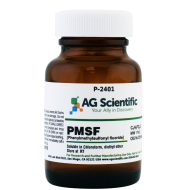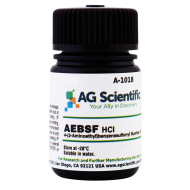An important serine protease inhibitor commonly utilized by biochemists and researchers, phenylmethylsulfonyl fluoride (PMSF)is often used to prepare cell lysates, helping to preserve critical samples.
About PMSF Inhibitor
Acting as a non-specific inhibitor, PMSF is often used to protect samples against the digestive functions of proteases, such as trypsin, chymotrypsin, and thrombin, as well as other enzymes. It is also used when preparing protein extracts taken from cells and tissues.
By deactivating the serine hydroxyl group of any enzyme that contains this amino acid, PMSF prevents the degradation of proteins of interest. Based on its short half-life, this inhibitor must be added during each purification step.
Applications of PMSF
- Commonly used in protein solubilization to deactivate specific proteins after cell lysis
- Serine protease inhibitor
- FAAH inhibitor
Chemical Data
| Chemical Formula: | C7H7FO2S |
| CAS Number: | 329-98-6 |
| Molecular Weight: | 174.2 Da |
| Appearance: | White fine needles/crystalline powder |
Frequently Asked Questions
What happens to PMSF in water?
Phenylmethylsulfonyl fluoride has limited solubility and is highly unstable in aqueous solutions. It should be added to buffers immediately before use. The half-life of an aqueous solution of phenylmethylsulfonyl fluoride is around 30 minutes at pH 8.Is PMSF hazardous?
Phenylmethylsulfonyl fluoride is a cytotoxic chemical which should be handled only inside a fume hood or certified Biological Safety Cabinet.Is there a non-toxic alternative to PMSF?
AEBSF HCl is a non-toxic alternative. It is an irreversible serine protease inhibitor, and is used at the same concentration as PMSF, but is nontoxic and stable in aqueous buffer solutions.How do I make a PMSF solution?
Stock solutions are usually made up in anhydrous ethanol, isopropanol, or DMSO. Phenylmethylsulfonyl fluoride is also soluble in ether, benzene, (anhydrous 2-propanol (200 mM), anhydrous methanol (200 mM), and anhydrous ethanol (200 mM).Effective in most protein solutions at 0.1 to 1 mM final concentration. Dissolve PMSF in isopropanol at 17.4 mg/mL (100 mM) and store in aliquots at -20°C.1. Weigh out 17.4 mg PMSF inhibitor
2. Add isopropanol to 10ml and dissolve.
3. No need to filter or sterilize.
4. Aliquot and store at 20°C.
Does this product require special handling?
PMSF is cytotoxic and hygroscopic, and should be protected from light.
What happens to this inhibitor if you increase pH and temperature?
The rate of inactivation increases with increasing pH and is faster at 25°C than at 4°C.What is the half-life of this inhibitor?
The half-life of a 20 mM aqueous solution of PMSF is ~35 min at pH 8.0.

